Deflation In China And Its Repercussions On The World!
Deflation, like seen in Japan in the 1990s, could choke off economic development if it continues for a long.

Amid these high prices of juicy red tomatoes and delicious onion that are burning the pockets of the common man, what if we say that there is a breakfast buffet with three types of rice porridge, sour and spicy soup and milk, costing just ₹35 (or 3 yuan)! Wonderful, delightful, right? However, what is always visible is not true as it is! This incident is witnessed in Dragon Nation China, which has slipped into deflation amid poor consumer demand, unemployment and weakening growth. According to site reports, meat prices were down 26%, and vegetable costs were down 1.5%.
Poor consumer appetite fuels a pricing war among lower-end restaurant chains in China, which analysts believe might affect smaller firms attempting to compete with larger competitors’ discounts. Deflation, like seen in Japan in the 1990s, could choke off economic development if it continues for a long.
:max_bytes(150000):strip_icc()/GettyImages-648261628-4654c89efd3147c5b1e29806890c1ed8.jpg)
China has always been famous for tingling the world with two famous events: its technologies, which undoubtedly have led to scientific developments, and the other triggering compromising situations. From the one-child policy to one nation policy to Covid to the conflict with India, to provoking the population bomb, and now deflation, China has always kept its head high in disturbing the world.
Unlike in Western countries, Chinese citizens were essentially left to cater for themselves financially throughout the pandemic, with government assistance mainly focused on the manufacturing sector. There was no instant consumer splurge when the limitations were eased, as some economists feared. With earnings and pensions scarcely moving and job prospects increasingly unpredictable, spending appetites are constrained, and confidence is low in a merely expanding economy.
According to workers, the central Nanchengxiang shop was packed, as it has been every morning since the 3 yuan deal was introduced in May. Yum China, the country’s KFC operator, is appealing the consumers with a burger, snack, and drink menu for 19.9 yuan. Now one might feel what the problem is as the traffic (here, the people) is back. To understand this, let’s learn the basic definition of deflation.
Deflation is defined as a general drop in the price of goods and services, which is usually coupled with a reduction in the economy’s availability of money and credit. On the surface, deflation appears to favour consumers since it allows them to buy more products and services with the same nominal income over time.

Lower prices, however, do not benefit everyone, and economists are frequently worried about the effects of dropping prices on various sectors of the economy, particularly in financial affairs. Deflation, in particular, can damage borrowers, who may be forced to repay their loans in currency worth more than the amount borrowed and any financial market players who invest or speculate on the promise of rising prices. Therefore, the event of lowering prices beyond a certain point can be alarming for the economy.
What are the repercussions/impacts of China’s deflation In the Indian economy?
Positive effect.
If investment in the Chinese economy is reduced due to their slowing economy and deflation, India might emerge and take over as the developed nations’ manufacturing hub. This appears to be something that developed countries have been pressing for to break China’s monopoly-like grip on the manufacturing industry. If economic reforms are pushed, India has the potential to become the next manufacturing centre.
Negative impact.
China continues to be India’s largest importer of iron ore. India supplies over 70% of the iron ore imported by East Asian countries. As a result, if China’s economy slows, the number of imports entering China may reduce, threatening the Indian economy. China’s import and export figures have been dull, prompting concerns about the country’s post-pandemic recovery.
How does China’s deflation affect the rest of the world?
For once, China’s prolonged spell of deflation may assist in containing growing costs in other areas of the world, including the United Kingdom. This is because China continues to be one of the world’s major producers of products. On the other hand, price cuts in China’s manufactured goods may have an impact on employment by reducing corporate investment. “A period of falling prices in China may also have an impact on corporate profits and consumer spending.” This might lead to more unemployment.”

Conclusion.
A lengthy deflation time, although perhaps reducing inflationary pressures elsewhere, might be problematic for global manufacturers as low-cost Chinese goods flood worldwide markets. China’s once-thriving consumer sector has suddenly plunged into deflation, with consumer prices falling for the first time in more than two years, sparking alarm across foreign markets. Analysts see this as an indicator of a larger economic problem. Let’s hope the world does not suffer again from Draconian actions.




